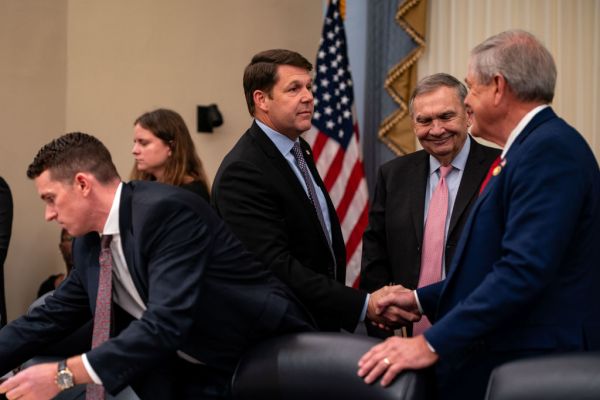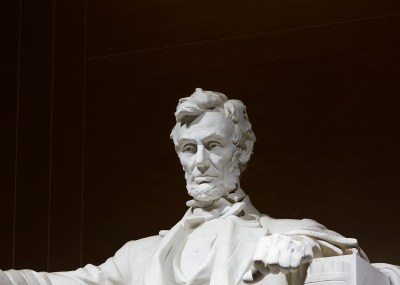Happy Monday! Mac McClung won the annual NBA Dunk Contest this weekend for the third time in a row, at one point dunking over a car and dunking two basketballs at once. He’s lucky Jonah was traveling this weekend and unable to participate.
Quick Hits: Today’s Top Stories
- The Justice Department officially moved on Friday to dismiss the federal corruption case against New York Mayor Eric Adams, following a series of resignations by federal prosecutors in protest of the move. Danielle Sassoon—the Trump-appointed acting U.S. attorney for the Southern District of New York—resigned last week instead of implementing the order, penning a letter alleging a proposed quid-pro-quo from Adams’ lawyers and DOJ officials. Emil Bove, the acting U.S. deputy attorney general, then took the order to the DOJ’s Public Integrity Section in an effort to find a prosecutor who would sign it, prompting several more resignations before a senior prosecutor agreed to do so, reportedly to protect his colleagues. The motion to dismiss the prosecution still needs to be approved by a federal judge.
- Israel on Saturday welcomed home three hostages—Alexander Troufanov, Iair Horn, and American-Israeli Sagui Dekel-Chen—after 498 days in terrorist captivity. The men, who recounted severe conditions and physical abuse during their time in the Gaza Strip, were freed as part of the U.S.-brokered ceasefire deal between Israel and Hamas. Also on Saturday, Israel released 369 Palestinian prisoners, 36 of whom had been serving life sentences. The successful exchange came days after Hamas threatened to collapse the three-phase agreement. Of the 33 Israeli hostages who had been slated to return in the first phase of the deal, 14 remain in Gaza, and negotiations to determine the conditions of the second phase have reportedly stalled.
- Secretary of State Marco Rubio traveled to Jerusalem on Sunday, meeting with Israeli Prime Minister Benjamin Netanyahu to discuss Iran, its proxies, and the fate of the ceasefire agreement in Gaza. The two men appeared to be in lockstep on the threat posed by the Iranian axis, with Rubio endorsing the Israeli prime minister’s ambition to “eradicate” Hamas and declaring that there “could never be a nuclear Iran.” Netanyahu, meanwhile, vowed to “finish the job” in the country’s ongoing multifront war against Iran. Also on Sunday, shipments of U.S.-made 2,000-pound bombs arrived in Israel on Sunday, ending Biden-era restrictions on the munitions’ sale to Jerusalem.
- Secretary Rubio arrived in Saudi Arabia on Monday morning ahead of scheduled negotiations between Russian officials and top Trump administration officials—including National Security Adviser Mike Waltz and Middle East envoy Steve Witkoff—aimed at ending the war in Ukraine. It’s unclear, however, whether Ukrainian representatives will participate in the talks. Ukrainian President Volodymyr Zelensky said in a Sunday interview with NBC News’ “Meet the Press” that his country would never accept a deal struck without Kyiv’s input. Zelensky’s remarks followed his meeting on Friday with Vice President J.D. Vance at the Munich Security Conference in Germany, where the two discussed the U.S. vision for ending the war.
- M23 rebels seized control of the Democratic Republic of Congo’s eastern city of Bukavu—the regional capital of the South Kivu province and home to 1.3 million people—on Sunday. The Rwandan-backed armed group’s advances, which reportedly met little resistance from government forces, followed M23 rebels’ capture of Goma, the largest city in eastern Congo, last month. The recent fighting—the latest flare-up in a three-year conflict—has left some 3,000 people dead and displaced hundreds of thousands more, many of whom had been sheltering in Bukavu.
- The Justice Department has moved to fire 20 immigration judges in recent days, multiple outlets reported Saturday. The layoffs, part of the Trump administration’s efforts to dramatically reduce the federal workforce, came amid a backlog of 3.7 million pending asylum cases. Administration officials have not provided a rationale for the firings, nor have they outlined plans to fill the vacancies. One of the dismissed judges, Biden appointee Kerry E. Doyle, alleged in a Saturday LinkedIn post that the move had been political.
- Lawyers for President Donald Trump asked the Supreme Court on Sunday to permit his firing of Hampton Dellinger, a lawyer who leads the Office of Special Counsel, a government watchdog agency. In the first Supreme Court case to test the limits of Trump’s aggressive assertion of presidential authority at the start of his second term, his lawyers asked the justices to reverse a federal judge’s order that temporarily reinstated Dellinger, writing that the “court should not allow lower courts to seize executive power by dictating to the president how long he must continue employing an agency head against his will.” Dellinger originally sued the Trump administration on the grounds that the president had exceeded his authority by firing him before his five-year term, set by congressional statute, was up.
‘The Political Religion of the Nation’

In lieu of a full item today, we hope you’ll take the time to read excerpts from Abraham Lincoln’s 1838 address to the Young Men’s Lyceum in Springfield, Illinois. The 28-year-old Lincoln’s speech—which followed the lynching of Francis McIntosh, a free black man, two years prior—serves as a stark reminder of the dangers of mob violence and disregard for law.
As a subject for the remarks of the evening, the perpetuation of our political institutions, is selected. … We find ourselves under the government of a system of political institutions, conducing more essentially to the ends of civil and religious liberty, than any of which the history of former times tells us. We, when mounting the stage of existence, found ourselves the legal inheritors of these fundamental blessings. We toiled not in the acquirement or establishment of them—they are a legacy bequeathed us, by a once hardy, brave, and patriotic, but now lamented and departed race of ancestors. Theirs was the task (and nobly they performed it) to possess themselves, and through themselves, us, of this goodly land; and to uprear upon its hills and its valleys, a political edifice of liberty and equal rights; ‘tis ours only, to transmit these, the former, unprofaned by the foot of an invader. … This task of gratitude to our fathers, justice to ourselves, duty to posterity, and love for our species in general, all imperatively require us faithfully to perform.
How then shall we perform it?—At what point shall we expect the approach of danger? By what means shall we fortify against it?—Shall we expect some transatlantic military giant, to step the Ocean, and crush us at a blow? Never!—All the armies of Europe, Asia and Africa combined, with all the treasure of the earth (our own excepted) in their military chest; with a Buonaparte for a commander, could not by force, take a drink from the Ohio, or make a track on the Blue Ridge, in a trial of a thousand years.
At what point then is the approach of danger to be expected? I answer, if it ever reach us, it must spring up amongst us. It cannot come from abroad. If destruction be our lot, we must ourselves be its author and finisher. As a nation of freemen, we must live through all time, or die by suicide.
I hope I am over wary; but if I am not, there is, even now, something of ill-omen, amongst us. I mean the increasing disregard for law which pervades the country; the growing disposition to substitute the wild and furious passions, in lieu of the sober judgment of Courts. … Accounts of outrages committed by mobs, form the every-day news of the times. They have pervaded the country, from New England to Louisiana. … Whatever, then, their cause may be, it is common to the whole country. …
But you are, perhaps, ready to ask, “What has this to do with the perpetuation of our political institutions?” … When men take it in their heads to day, to hang gamblers, or burn murderers, they should recollect, that, in the confusion usually attending such transactions, they will be as likely to hang or burn someone who is neither a gambler nor a murderer as one who is; and that, acting upon the example they set, the mob of tomorrow, may, and probably will, hang or burn some of them by the very same mistake. ... [A]nd thus it goes on, step by step, till all the walls erected for the defense of the persons and property of individuals, are trodden down, and disregarded. But all this even, is not the full extent of the evil. By such examples, by instances of the perpetrators of such acts going unpunished, the lawless in spirit, are encouraged to become lawless in practice; and having been used to no restraint, but dread of punishment, they thus become, absolutely unrestrained. Having ever regarded Government as their deadliest bane, they make a jubilee of the suspension of its operations; and pray for nothing so much, as its total annihilation. While, on the other hand, good men, men who love tranquility, who desire to abide by the laws, and enjoy their benefits, who would gladly spill their blood in the defense of their country; seeing their property destroyed; their families insulted, and their lives endangered; their persons injured; and seeing nothing in prospect that forebodes a change for the better; become tired of, and disgusted with, a Government that offers them no protection; and are not much averse to a change in which they imagine they have nothing to lose. Thus, then, by the operation of this mobocractic spirit, which all must admit, is now abroad in the land, the strongest bulwark of any Government, and particularly of those constituted like ours, may effectually be broken down and destroyed—I mean the attachment of the People. …
The question recurs, “how shall we fortify against it?” The answer is simple. Let every American, every lover of liberty, every well wisher to his posterity, swear by the blood of the Revolution, never to violate in the least particular, the laws of the country; and never to tolerate their violation by others. As the patriots of seventy-six did to the support of the Declaration of Independence, so to the support of the Constitution and Laws, let every American pledge his life, his property, and his sacred honor;—let every man remember that to violate the law, is to trample on the blood of his father, and to tear the character of his own, and his children’s liberty. Let reverence for the laws, be breathed by every American mother, to the lisping babe, that prattles on her lap—let it be taught in schools, in seminaries, and in colleges; let it be written in Primers, spelling books, and in Almanacs;—let it be preached from the pulpit, proclaimed in legislative halls, and enforced in courts of justice. And, in short, let it become the political religion of the nation; and let the old and the young, the rich and the poor, the grave and the gay, of all sexes and tongues, and colors and conditions, sacrifice unceasingly upon its altars. ...
When I so pressingly urge a strict observance of all the laws, let me not be understood as saying there are no bad laws, nor that grievances may not arise, for the redress of which, no legal provisions have been made—I mean to say no such thing. But I do mean to say, that, although bad laws, if they exist, should be repealed as soon as possible, still while they continue in force, for the sake of example, they should be religiously observed. So also in unprovided cases. If such arise, let proper legal provisions be made for them with the least possible delay; but, till then, let them, if not too intolerable, be borne with.
There is no grievance that is a fit object of redress by mob law. …
But, it may be asked, why suppose danger to our political institutions? Have we not preserved them for more than fifty years? And why may we not for fifty times as long? …
That our government should have been maintained in its original form from its establishment until now, is not much to be wondered at. It had many props to support it through that period, which now are decayed, and crumbled away. Through that period, it was felt by all, to be an undecided experiment; now, it is understood to be a successful one.—Then, all that sought celebrity and fame, and distinction, expected to find them in the success of that experiment. … If they succeeded, they were to be immortalized. … If they failed, they were to be called knaves and fools, and fanatics for a fleeting hour; then to sink and be forgotten. They succeeded. The experiment is successful; and thousands have won their deathless names in making it so. But the game is caught; and I believe it is true, that with the catching, end the pleasures of the chase. This field of glory is harvested, and the crop is already appropriated. But new reapers will arise, and they, too, will seek a field. It is to deny, what the history of the world tells us is true, to suppose that men of ambition and talents will not continue to spring up amongst us. And, when they do, they will as naturally seek the gratification of their ruling passion, as others have so done before them. The question then, is, can that gratification be found in supporting and maintaining an edifice that has been erected by others? Most certainly it cannot. Many great and good men sufficiently qualified for any task they should undertake, may ever be found, whose ambition would inspire to nothing beyond a seat in Congress, a gubernatorial or a presidential chair; but such belong not to the family of the lion, or the tribe of the eagle. What! think you these places would satisfy an Alexander, a Caesar, or a Napoleon?—Never! Towering genius distains a beaten path. … Is it unreasonable then to expect, that some man possessed of the loftiest genius, coupled with ambition sufficient to push it to its utmost stretch, will at some time, spring up among us? And when such a one does, it will require the people to be united with each other, attached to the government and laws, and generally intelligent, to successfully frustrate his designs.
Distinction will be his paramount object, and although he would as willingly, perhaps more so, acquire it by doing good as harm; yet, that opportunity being past, and nothing left to be done in the way of building up, he would set boldly to the task of pulling down. …
Another reason which once was; but which, to the same extent, is now no more, has done much in maintaining our institutions thus far. I mean the powerful influence which the interesting scenes of the revolution had upon the passions of the people as distinguished from their judgment. …
I do not mean to say, that the scenes of the revolution are now or ever will be entirely forgotten; but that like every thing else, they must fade upon the memory of the world, and grow more and more dim by the lapse of time. …
They were the pillars of the temple of liberty; and now, that they have crumbled away, that temple must fall, unless we, their descendants, supply their places with other pillars, hewn from the solid quarry of sober reason. Passion has helped us; but can do so no more. It will in future be our enemy. Reason, cold, calculating, unimpassioned reason, must furnish all the materials for our future support and defence.—Let those materials be moulded into general intelligence, sound morality, and in particular, a reverence for the constitution and laws: and, that we improved to the last; that we remained free to the last; that we revered his name to the last; that, during his long sleep, we permitted no hostile foot to pass over or desecrate his resting place; shall be that which to learn the last trump shall awaken our WASHINGTON.
Upon these let the proud fabric of freedom rest, as the rock of its basis; and as truly as has been said of the only greater institution, “the gates of hell shall not prevail against it.”
Worth Your Time
- In his column for the New York Times, our old friend David French considered whether the Trump administration has made itself susceptible to Russia’s nuclear blackmail. “The hovering threat of Russia’s nuclear arsenal is one explanation for the Trump administration’s shocking weakness in its dealings with Russia. It will stand tall when confronting allies like Denmark, Canada, Mexico and Panama. It will threaten war crimes when dealing with a puny, diminished military force like Hamas. But regarding Russia? Consider the following news items from the past few days alone. Donald Trump initially refused to promise that he would even include Ukraine in his negotiations with Russia, as if Ukraine were a mere pawn on the chessboard. (He reversed himself and said later that ‘of course’ Ukraine would have a place at the table.) He spoke to Vladimir Putin on Wednesday, an event Russians celebrated. The Russian stock market soared, and a Russian lawmaker said the call ‘broke the West’s blockade,’” he wrote. “I see the events of the past week, and I see weakness — weakness that makes a world war (including a potential nuclear exchange) more likely, not less. … Like a schoolyard bully who’s afraid of his peers, Trump is tough on Canada but weak on Russia. And that weakness may not just cost Ukraine its independence; it could set the stage for a cataclysm.”
Presented Without Comment
President Donald Trump on X, borrowing a phrase attributed to Napoleon Bonaparte: “He who saves his Country does not violate any Law.”
Also Presented Without Comment
Resignation letter of Hagan Scotten, the assistant U.S. Attorney for the Southern District of New York who refused to follow a directive from DOJ leadership to dismiss the federal case against New York City Mayor Eric Adams:
Any assistant U.S. attorney would know that our laws and traditions do not allow using the prosecutorial power to influence other citizens, much less elected officials, in this way. If no lawyer within earshot of the President is willing to give him that advice, then I expect you will eventually find someone who is enough of a fool, or enough of a coward, to file your motion. But it was never going to be me.
Also Also Presented Without Comment
NBC News: Trump Administration Wants to Un-Fire Nuclear Safety Workers But Can’t Figure Out How to Reach Them
In the Zeitgeist
Saturday Night Live celebrated its 50th anniversary last night with a star-studded series of comedy skits and musical guests. To us, the performance of “Homeward Bound” by Paul Simon and Sabrina Carpenter—a surprisingly natural duo—stole the show.
Toeing the Company Line
- In the newsletters: Jonah Goldberg wrote about the roots of Trump’s worldview, Nick Catoggio praised Danielle Sassoon’s decision to resign, and Muslim scholar Mustafa Akyol broke down the different interpretations of blasphemy in Islam for the latest Dispatch Faith.
- On the podcasts: Jonah’s latest solo Remnant delved into theories of executive power, and Michael Reneau interviewed (🔒) Christianity Today’s Kate Shellnut about Paula White and other faith leaders backing Trump. On today’s episode of The Dispatch Podcast, Jamie Weinstein is joined by Tim Mak to discuss the latest news out of Ukraine.
- On television: Steve Hayes appeared on PBS News’ “Washington Week,” and Sarah Isgur was on the ABC News “This Week” panel.
- On the site over the weekend: Joseph Holmes wrote about the recent trend of Valentine’s Day horror movies, Mike Warren took stock of Saturday Night Live’s place in modern pop culture as the show turned 50, and James P. Sutton reviewed Jonathan Rauch’s recent book on Christians and democracy.
- On the site today: Nathan Beacom pens this week’s Monday Essay about artificial intelligence and the “false god of convenience,” Grayson Logue dives into the Trump administration’s decision to halt funds to New York City for migrant services, and Charles Hilu outlines what’s next in the budget reconciliation process.
Let Us Know
Do you have a favorite piece of presidential rhetoric you’ll be revisiting today?









Please note that we at The Dispatch hold ourselves, our work, and our commenters to a higher standard than other places on the internet. We welcome comments that foster genuine debate or discussion—including comments critical of us or our work—but responses that include ad hominem attacks on fellow Dispatch members or are intended to stoke fear and anger may be moderated.
With your membership, you only have the ability to comment on The Morning Dispatch articles. Consider upgrading to join the conversation everywhere.